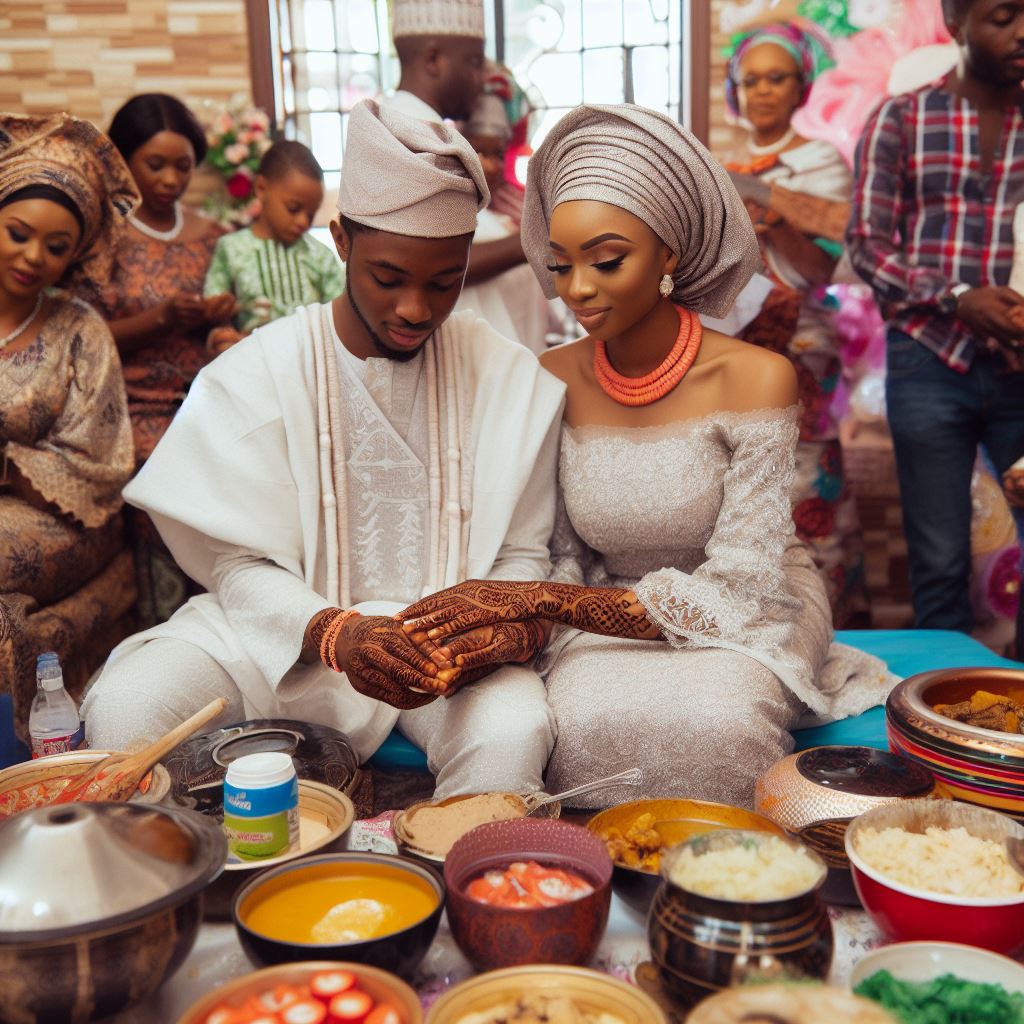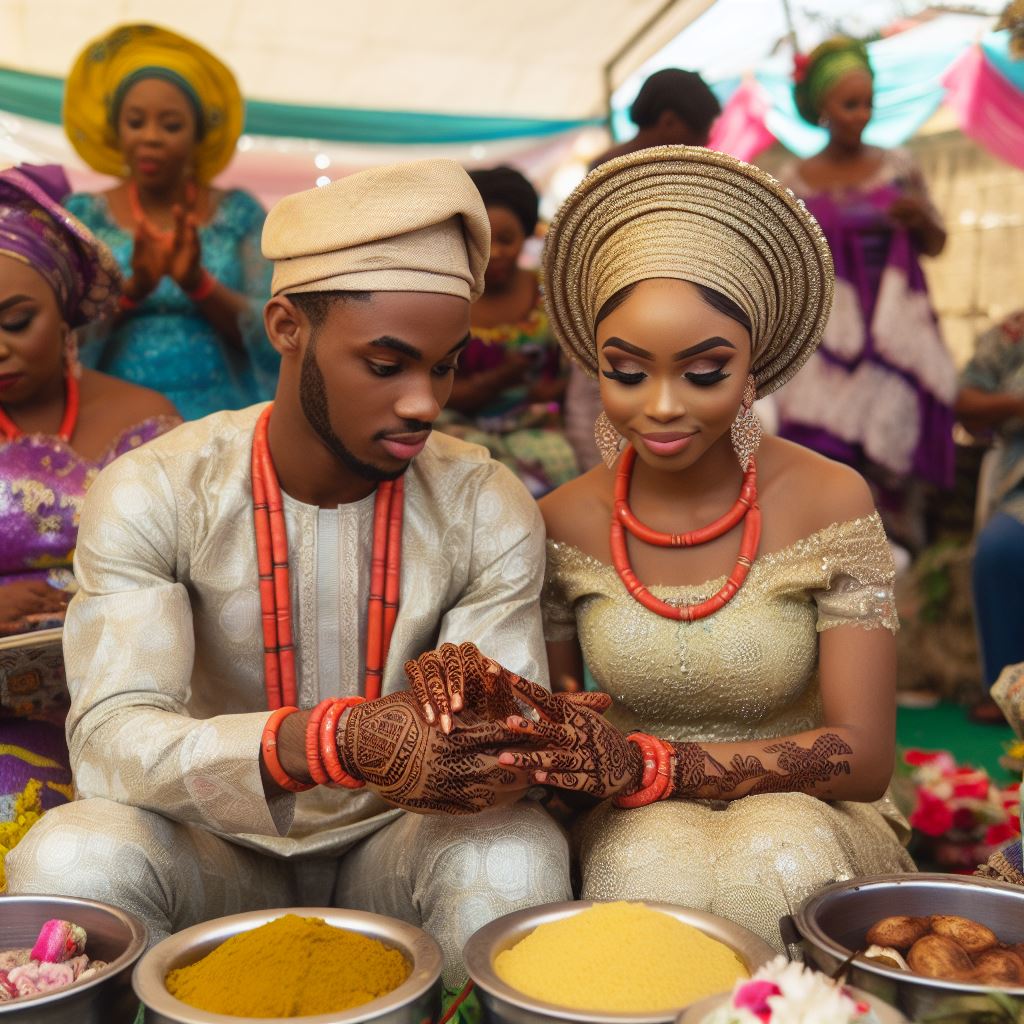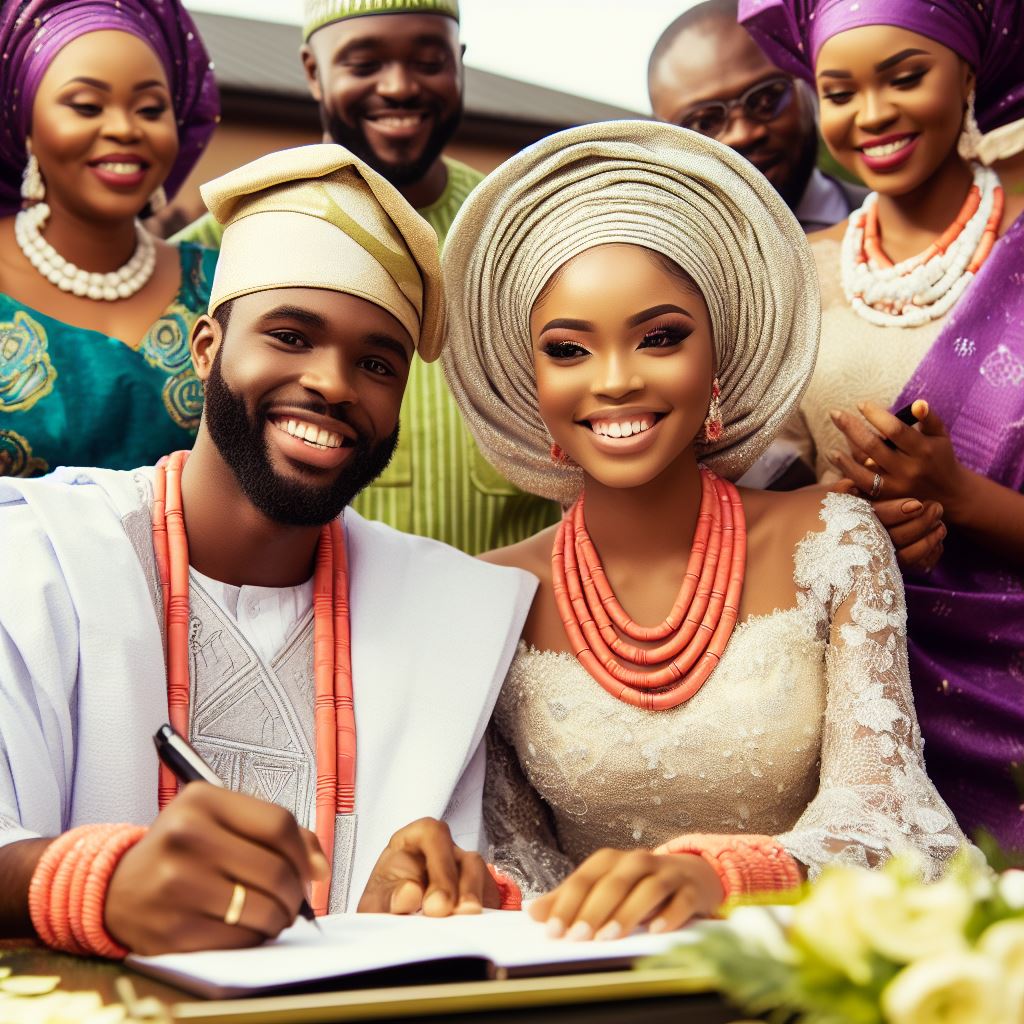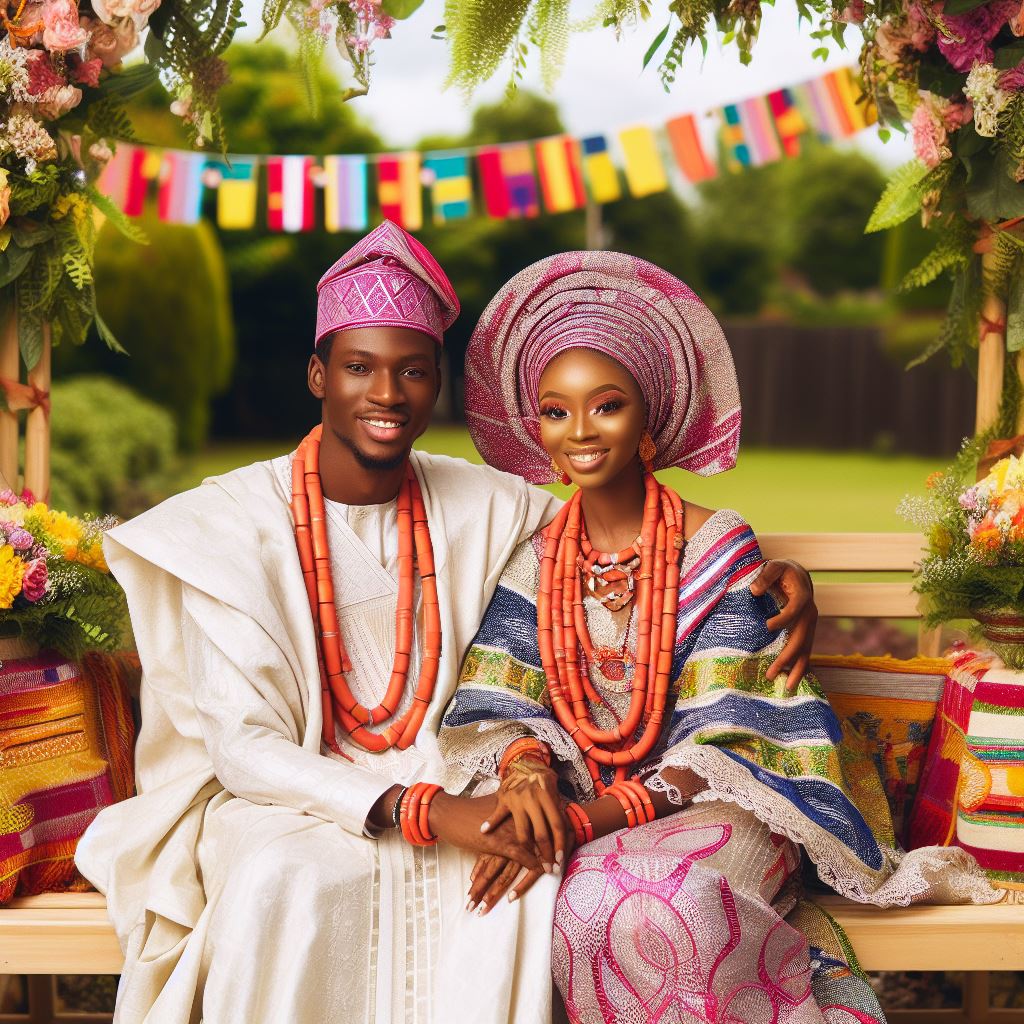Introduction
A. Explanation of Yoruba culture and traditions
Yoruba culture, which originated from the Yoruba people in Nigeria, is deeply rooted in traditional practices and beliefs.
This ethnic group values their rich cultural heritage and upholds it in various aspects of life, including marriage.
B. Importance of traditional Yoruba marriage wishes
In Yoruba culture, marriage is considered a sacred institution and the union of two families.
Traditional marriage wishes play a crucial role in this ceremony as they convey well-wishes, blessings, and prayers for the couple’s happiness, prosperity, and fruitful union.
During Yoruba traditional wedding ceremonies, wishes are expressed through melodious songs, heartfelt prayers, and proverbs, symbolizing the importance of community support in the success of the marriage.
These wishes serve as reminders of the values and expectations upheld within the Yoruba culture.
These marriage wishes also hold significant meanings.
For example, the wish “Ese o, nkan ayo oni won wa oo” translates to “Thank you, may joy never cease,” expressing gratitude and the hope for everlasting happiness in the marriage.
Moreover, traditional Yoruba marriage wishes enhance the cultural identity and sense of belonging for both the couple and their families by connecting them to their ancestry and heritage.
It creates a profound bond and strengthens the cultural fabric within the Yoruba community.
Traditional Yoruba marriage wishes carry immense importance in preserving the cultural traditions and values of the Yoruba people.
They provide blessings, optimism, and a sense of community, ensuring a joyous and prosperous union for the newlyweds.
Read: Igbankwu: The Beauty of Igbo Traditional Marriages
Traditional Yoruba Marriage Wishes
In Yoruba culture, marriage wishes hold deep meaning and significance.
They play a crucial role in the marital journey, ensuring happiness and prosperity for the couple.
While traditional marriage wishes have their own charm, modern Yoruba marriage wishes have their own unique characteristics.
Let’s explore these aspects in detail:
A. Meaning and significance of marriage wishes in Yoruba culture
- Cultural Reflection: Yoruba marriage wishes reflect the rich cultural heritage and values of the Yoruba people. They serve as a way to honor and celebrate the union of two individuals.
- Blessings and Good Wishes: These wishes are a way for family and friends to convey their blessings and good wishes to the couple.
They pray for their happiness, love, and prosperity throughout their married life. - Community Support: Yoruba marriage wishes also symbolize the support and involvement of the community in the couple’s journey.
They strengthen the bonds between families and relatives, creating a supportive network. - Spiritual Connection: Many marriage wishes in Yoruba culture are rooted in religious beliefs.
They seek the blessings of the ancestors and deities, ensuring divine protection and guidance for the newlyweds.
B. Role of marriage wishes in the marital journey
- Setting the Tone: Traditional Yoruba marriage wishes set a positive and auspicious tone for the couple’s marital journey.
They create a joyful and optimistic atmosphere, instilling confidence in the couple’s future together. - Strengthening the Bond: These wishes act as a bonding agent between the couple and their families. They bring everyone together, fostering unity and harmony among the families involved.
- Cultural Preservation: Yoruba marriage wishes help preserve and promote the cultural heritage of the Yoruba people.
They provide an opportunity to pass down traditions from one generation to the next, ensuring their continuity. - Words of Wisdom: Often, marriage wishes include wise counsel for the couple. Elders and well-wishers share their experiences and offer advice on how to build a successful and fulfilling marriage.
C. Differences between traditional and modern Yoruba marriage wishes
- Language and Style: Traditional Yoruba marriage wishes are usually expressed in the Yoruba language, using poetic and metaphorical expressions.
On the other hand, modern marriage wishes may incorporate English or other languages and adopt a more contemporary style. - Content and Length: Traditional wishes tend to be longer and encompass various aspects of married life, including fertility, love, and prosperity.
Modern wishes are often shorter and may focus on specific aspects such as companionship and mutual respect. - Influence of Western Culture: Modern Yoruba marriage wishes may also incorporate elements of Western culture.
They may include wishes for a fairytale romance, a white wedding, or a honeymoon – reflecting the influence of Western traditions. - Accessibility: With the advent of technology, modern marriage wishes can be easily shared through social media platforms, while traditional wishes were mostly conveyed in person or through handwritten letters.
Yoruba marriage wishes hold immense cultural, emotional, and practical significance
They serve as a powerful tool in establishing a strong foundation for a successful marriage.
Whether traditional or modern, these wishes strengthen the bond between the couple and their families, while celebrating the rich Yoruba heritage.
Read: Islamic Marital Duties: A Guide for Nigerian Couples
Traditional Yoruba Marriage Wishes
A. Explanation of Each Wish
1. “Àárín ọkọ àti aya, a o ní ǹkan gbó” (May the bond between husband and wife be strong.)
- This wish emphasizes the importance of a resilient and unbreakable bond between the couple, highlighting unity and trust.
2. “Ọkọ àti aya a gbé ẹni ọmọ” (May the husband and wife have children.)
- Signifying fertility and continuity, this wish expresses the desire for the couple to have offspring to carry on the family legacy.
3. “Ọmọ a jẹun ọmọ a ṣẹkù” (May the children eat and prosper.)
- It wishes for the well-being and success of the children, stressing the importance of their growth and prosperity.
4. “Ìgbé àárín ọkọ àti aya a yà ṣẹlẹ” (May the marriage between husband and wife be successful.)
- This wish prays for a prosperous and harmonious marital life, with success and achievements in all endeavors.
5. “Ọkọ àti aya a jẹ ẹni àgbà” (May the husband and wife live long.)
- Highlighting longevity, this wish expresses the hope that the couple will enjoy a fulfilling and enduring life together.
B. Historical and Cultural Context of Each Wish
These wishes are deeply rooted in Yoruba culture and tradition, reflecting the core values of the Yoruba people.
Family, unity, fertility, and prosperity hold great significance in Yoruba society.
These wishes are a way of expressing the community’s collective hopes for the newlyweds.
C. Examples of How Yoruba Couples Incorporate These Wishes into Their Wedding Ceremonies
During Yoruba wedding ceremonies, these wishes are recited, either by elders or a designated speaker, as a form of blessing for the couple.
Sometimes, they are woven into prayers and spoken while the couple kneels before their parents or elders.
As part of the ceremony, the couple might also exchange symbolic gifts and gestures that represent these wishes.
For instance, they may exchange kola nuts to symbolize fertility, or pour libations to honor their ancestors and seek their blessings for a strong marriage.
In modern Yoruba weddings, couples often incorporate these wishes into their vows or have them inscribed on wedding invitations, programs, or decorations.
They serve as a reminder of the rich cultural heritage and values that underpin their union.
In fact, these Yoruba marriage wishes encapsulate the profound aspirations of the Yoruba people for newlyweds.
They celebrate not only the love between the couple but also the continuation of the family and the wider community, making them an integral part of Yoruba wedding ceremonies.
Read: Marriage Certificate in Nigeria: A Step-by-Step Guide
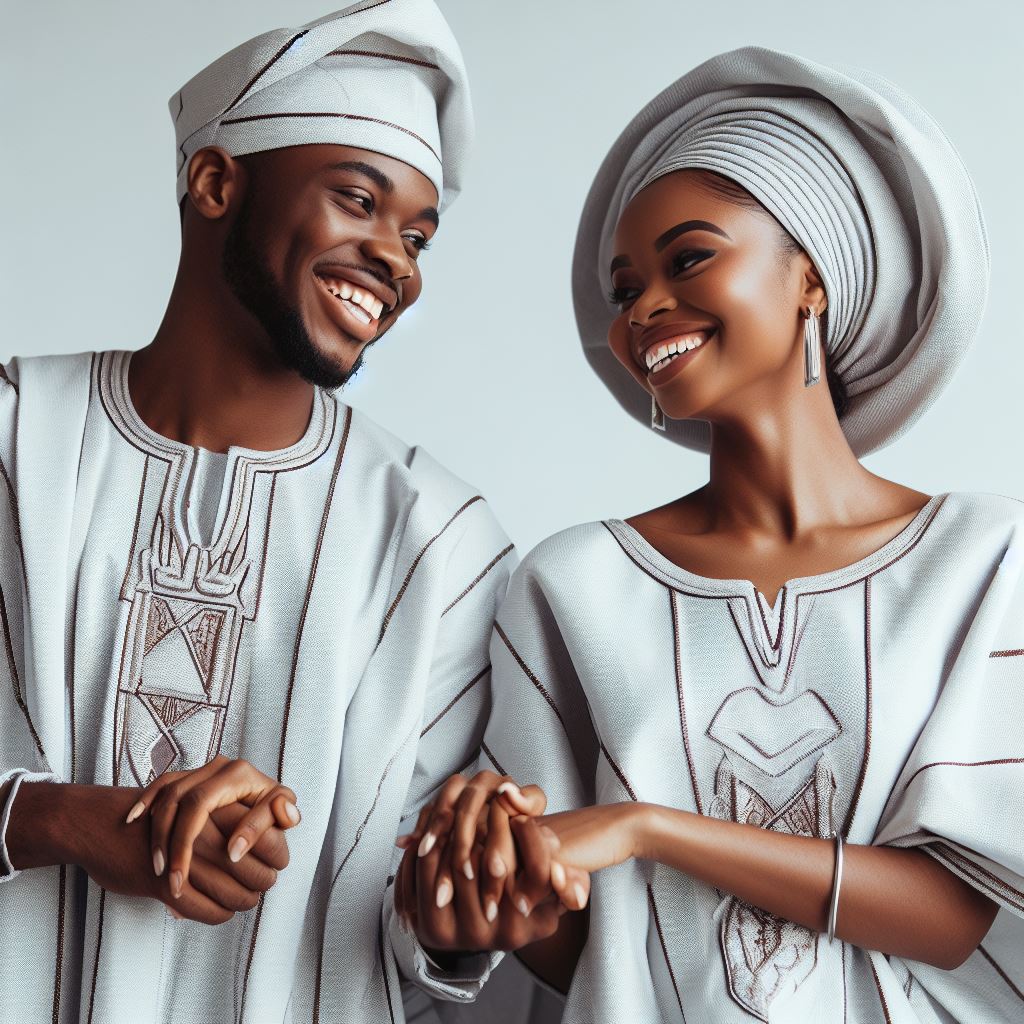
Symbolism and Significance
A. Interpretation of common symbols in Yoruba marriage wishes
1. Melody and harmony:
- The Yoruba believe that a successful marriage requires a beautiful melody and harmonious partnership.
- The symbol of melody signifies the couple’s ability to create a joyful rhythm together.
- Harmony symbolizes their ability to work in sync and resolve conflicts peacefully.
2. Joy and companionship:
- Yoruba marriage wishes often emphasize the importance of joy and companionship in a relationship.
- Joy represents the happiness that should be present in the marriage, bringing laughter and positivity.
- Companionship symbolizes the bond between the couple, their ability to support and be there for each other.
3. Fertility and parenthood:
- Yoruba culture places great importance on fertility and the ability to bear children.
- Marriage wishes often include prayers for the couple to be blessed with children.
- Fertility symbolizes the continuation of the family lineage and the growth of the community.
B. Why these wishes continue to be important in Yoruba culture
The Yoruba people have deep-rooted cultural beliefs and traditions surrounding marriage.
These wishes hold immense significance because:
- They serve as a reminder of the core values and expectations within a marriage.
- The wishes help set a positive tone for the couple’s journey together.
- They reinforce the importance of unity, happiness, and procreation in the Yoruba community.
- These wishes reflect the desire for a strong and harmonious foundation in a marriage.
- They provide a sense of cultural identity and connect couples to their heritage.
C. Impact of marriage wishes on the broader Yoruba community
The influence of Yoruba marriage wishes extends beyond the couple themselves.
Their significance resonates throughout the broader Yoruba community:
- Marriage wishes help to uphold cultural traditions and values.
- They promote social cohesion and unity among Yoruba families.
- The wishes inspire younger generations to appreciate and respect their cultural heritage.
- They foster a sense of collective responsibility for the success of marriages within the community.
- Marriage wishes create opportunities for communal celebrations and strengthen community bonds.
Yoruba marriage wishes carry deep symbolism and significance in the culture.
They represent the harmonious partnership, joy, fertility, and companionship desired in a successful marriage.
These wishes continue to be important as they reinforce cultural values, set a positive tone, and strengthen the Yoruba community’s bonds.
By understanding and embracing these wishes, couples can honor their cultural heritage and foster a prosperous married life.
Read: Legal Implications of Not Having a Marriage Certificate in Nigeria
Conclusion
A. Recap of the Importance and Meaning of Traditional Yoruba Marriage Wishes
In this journey through traditional Yoruba marriage wishes, we’ve uncovered the deep-rooted significance these wishes hold in the hearts and culture of the Yoruba people.
They are not merely words spoken in passing but profound expressions of love, unity, and blessings that are meant to shape the course of a couple’s life together.
B. Reflection on the Significance of Cultural Traditions in Marriage
As we reflect on these wishes, we cannot ignore the broader importance of cultural traditions in marriage.
These traditions extend beyond the Yoruba culture, bearing witness to the universal longing to form meaningful connections in marriage’s sacred bond.
C. Encouragement to Embrace and Honor Yoruba Rituals and Wishes in Modern Marriages
In closing, we encourage couples, regardless of their cultural backgrounds, to embrace the wisdom and beauty of Yoruba rituals and wishes.
In doing so, we honor not only the Yoruba heritage but also the enduring love and values they represent.
Now In an ever-diversifying world, we must recall that celebrating and preserving cultural traditions enriches the tapestry of love, unity, and blessings for everyone.

